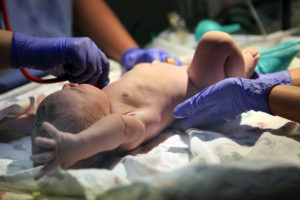
What Causes Hypoxia?
Hypoxia before, during, or after birth can be caused by a number of different factors including:
- Nuchal umbilical cord (cord wrapped around the baby’s neck)
- Knotted umbilical cord
- Short umbilical cord
- Umbilical cord prolapse
- Placental abruption
- Difficult forceps delivery
- Breech birth
Poorly managed delivery complications can, unfortunately, lead to hypoxia. If the right steps are taken, and a medical professional carefully monitors the mother and the baby during pregnancy, labor, and immediately after birth the harmful effects of hypoxia may be prevented. Medical professionals must adhere to the appropriate standard of care so that any distress is properly identified and treated.
Birth Injuries Caused by Hypoxia
Hypoxia deprives the brain of oxygen and can lead to a number of different injuries. Even a relatively mild deprivation of oxygen can lead to long-term problems. In some cases, hypoxia can lead to the death of an infant . A child who survives hypoxia may develop Hypoxic Ischemic Encephalopathy (HIE) and is likely to have one or more birth injuries including:
- Cerebral palsy
- Cognitive and developmental delays
- Seizure disorder
- Behavioral disorders
These birth injuries can be life-altering and have a financial and emotional impact on a family. The costs of managing a birth injury can be long-term and astronomical. The emotional fallout from realizing that your child will need constant assistance can be difficult for all involved. When these birth injuries are the result of medical malpractice, the anger and frustration can be compounded.
If your baby has sustained a birth injury due to the negligence of a medical professional, you should have an experienced attorney evaluate your case. At Bonina & Bonina, P.C., we have over 50 years of experience helping New Yorkers injured by medical malpractice. Contact us online or call us at 1-888-MEDLAW1 to schedule your free consultation. Home and hospital visits are available. Se habla español.
